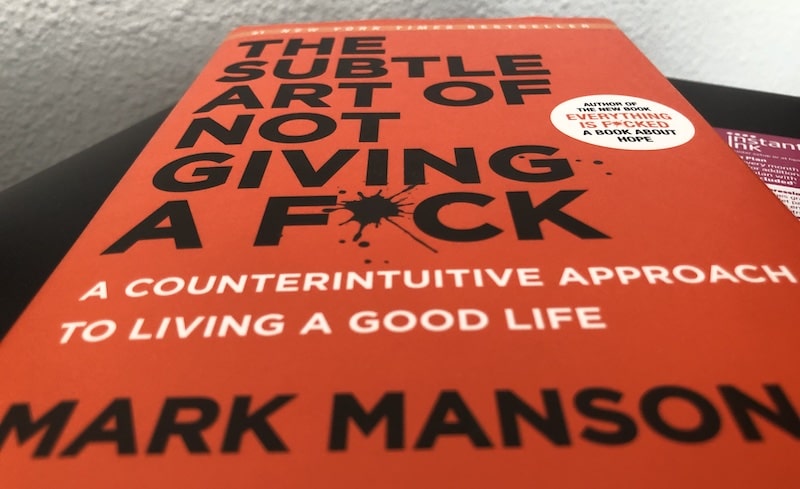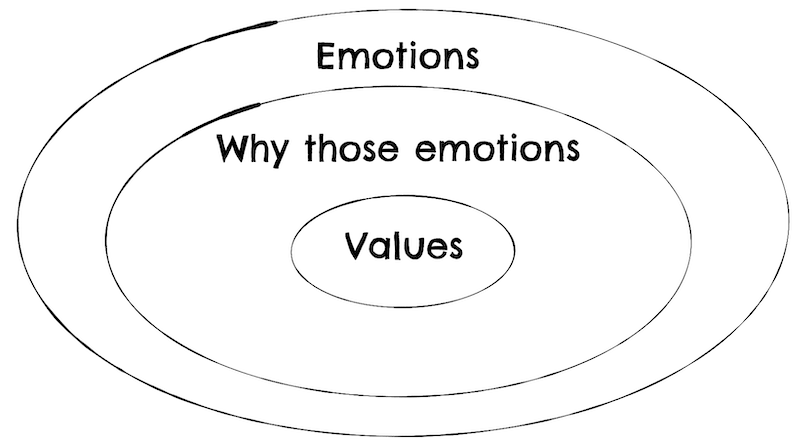Book notes: The Subtle Art of Not Giving a F*ck
Book notes on "The Subtle Art of Not Giving a F*ck" by Mark Manson

These are my notes on The Subtle Art of Not Giving a F*ck by Mark Manson.
The book was recommended by a fellow CTO who hated his job. It was a good read to start a sabbatical.
Key Insights
- True happiness occurs only when you find the problems you enjoy having and enjoy solving.
- Whatever makes us feel good will also inevitably make us feel bad.
- Mass-media-driven exceptionalism:
- The inundation of the exceptional makes people feel worse about themselves.
- Being “average” has become the new standard of failure.
- Don’t measure yourself as a raising star or genius, but as a more mundane entity.
- If you want to change how you see your problems, you have to change what you value and/or how you measure failure/success.
- Responsibility for everything that occurs in your life, regardless of who’s at fault.
- Fault is past tense.
- Responsibility is present tense.
- Certainty is the enemy of growth.
- Would being wrong create a better or a worse problem than my current problem, for both myself and others?
- Action isn’t just the effect of motivation, it is also the cause of it.
The fear of death follows from the fear of life. A man who live fully is prepared to die at any time. Mark Twain
Chapter 1: Don’t Try
The desire for more positive experience is itself a negative experience. And, paradoxically, the acceptance of one’s negative experience is itself a positive experience.
The more you pursue feeling better all the time, the less satisfied you become. The Backwards Law by Alan Watts
- Everything worthwhile in life is won through surmounting the associated negative experience.
- The avoidance of suffering is a form of suffering.
- The avoidance of struggle is a struggle.
- The subtle art of not giving a fuck:
- How to pick and choose what matters to you and what does not matter to you based on finely honed personal values.
- Subtlety #1: Not being indifferent, but being comfortable being different.
- It means not caring about adversity to reach your goals.
- Subtlety #2: You must give a fuck about something more important than adversity.
- Subtlety #3: Whether you realize it or not, you are always choosing what to give a fuck about:
- Maturity == to become more selective about the fucks you are willing to give.
Chapter 2: Happiness Is a Problem
- Suffering is biologically useful: it is nature’s preferred agent for inspiring change.
- Happiness comes from solving problems.
- Hope for a life full of good problems.
- Problems never stop; they merely get exchanged and/or upgraded.
- True happiness occurs only when you find the problems you enjoy having and enjoy solving.
- Denial and Victim mentality are the two main ways of avoiding solving problems.
- Emotions are another feedback mechanism.
- Don’t obsess or over-identify with them.
- Everything comes with an inherent sacrifice:
- What creates our positive experiences will define our negative experiences.
- Whatever makes us feel good will also inevitably make us feel bad.
- Our struggles determine our successes.
Chapter 3: You Are Not Special
- Entitlement:
- I’m awesome and the rest of you all suck, so I deserve special treatment.
- I suck and the rest of you are all awesome, so I deserve a special treatment.
- Mass-media-driven exceptionalism:
- The inundation of the exceptional makes people feel worse about themselves.
- Being “average” has become the new standard of failure.
Chapter 4: The Value of Suffering
- Self-awareness onion:

- What is objectively true about your situation is not as important as how you come to see the situation, how you chose to measure it and value it.
- We’re apes.
- If you want to change how you see your problems, you have to change what you value and/or how you measure failure/success.
- Shitty values:
- Pleasure: the most superficial form of satisfaction, the easiest to obtain and lose.
- It is what is marketed to us 24/7.
- Material success.
- Always being right.
- Staying positive.
- Pleasure: the most superficial form of satisfaction, the easiest to obtain and lose.
- Good values are:
- Reality-based.
- Socially constructive.
- Immediate and controllable.
- Author’s five values (one per next chapter):
- Responsibility for everything that occurs in your life, regardless of who’s at fault.
- Uncertainty.
- Failure.
- Rejection: both say no and hear no.
- Contemplation of one’s own mortality.
Chapter 5: You are always choosing
With great responsibility comes great power.
- Responsible for a problem != be at fault.
- Fault is past tense.
- Responsibility is present tense.
- Change on values will bring:
- Uncertainty.
- Feel like a failure: For some time you will measure yourself with the old values.
- Rejections: many of you relationships are built around the old values.
Chapter 6: You’re Wrong About Everything (But So I Am)
- Growth is an endless iterative process.
- Certainty is the enemy of growth.
- Nothing is certain until it has already happened and even then it is still debatable.
Once we create meaning for ourselves, our brains are designed to hold on to that meaning.
The more something threatens your identity, the more you will avoid it. Manson’s Law of Avoidance
Don’t be special; don’t be unique. Don’t measure yourself as a raising star or genius, but as a more mundane entity.
- Question yourself:
- What if I am wrong?
- What would it mean if I were wrong?
- Would being wrong create a better or a worse problem than my current problem, for both myself and others?
Chapter 7: Failure Is the Way Forward
- If someone is better than you at something, then it’s likely because she has failed at it more than you have.
- “Do something” principle:
- Action isn’t just the effect of motivation, it is also the cause of it.
Chapter 8: The importance of Saying No
- We are defined by what we choose to reject.
- Paradox of choice:
- The more options we’ve given, the less satisfied we become with whatever we choose, because we’re aware of all the other options we’re potentially forfeiting.
Chapter 9: … And Then You Die
- Without death, everything would feel inconsequential.
Our “immortality projects” do not allow us to freely choose our values, hence our path to happiness. Ernest Becker, The Denial of Death
- Immortality projects: those to preserve our identities after we are dead.
The fear of death follows from the fear of life. A man who live fully is prepared to die at any time. Mark Twain